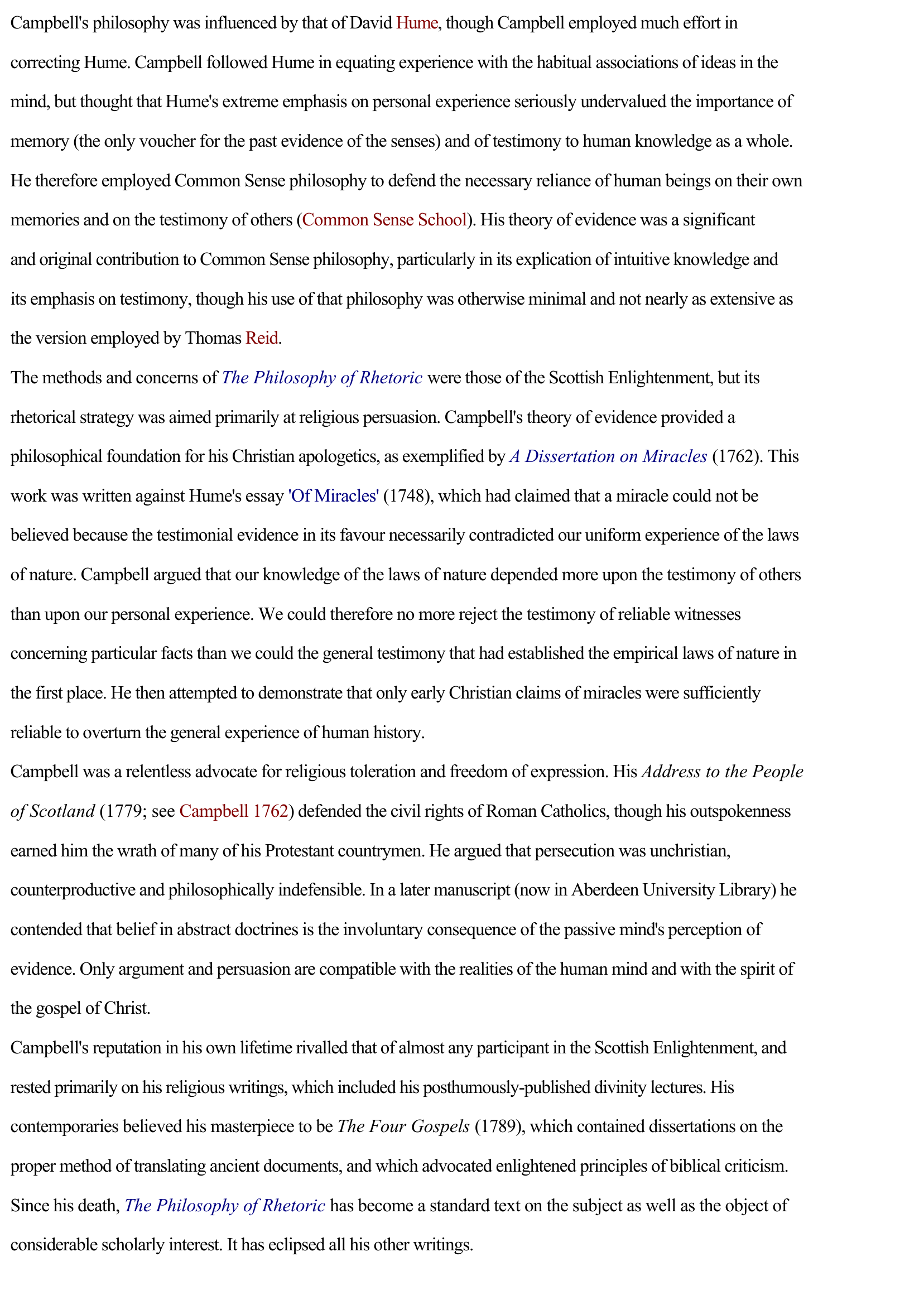Campbell, George
Publié le 22/02/2012

Extrait du document
«
Campbell's philosophy was influenced by that of David Hume , though Campbell employed much effort in
correcting Hume.
Campbell followed Hume in equating experience with the habitual associations of ideas in the
mind, but thought that Hume's extreme emphasis on personal experience seriously undervalued the importance of
memory (the only voucher for the past evidence of the senses) and of testimony to human knowledge as a whole.
He therefore employed Common Sense philosophy to defend the necessary reliance of human beings on their own
memories and on the testimony of others ( Common Sense School ).
His theory of evidence was a significant
and original contribution to Common Sense philosophy, particularly in its explication of intuitive knowledge and
its emphasis on testimony, though his use of that philosophy was otherwise minimal and not nearly as extensive as
the version employed by Thomas Reid .
The methods and concerns of The Philosophy of Rhetoric were those of the Scottish Enlightenment, but its
rhetorical strategy was aimed primarily at religious persuasion.
Campbell's theory of evidence provided a
philosophical foundation for his Christian apologetics, as exemplified by A Dissertation on Miracles (1762).
This
work was written against Hume's essay 'Of Miracles' (1748), which had claimed that a miracle could not be
believed because the testimonial evidence in its favour necessarily contradicted our uniform experience of the laws
of nature.
Campbell argued that our knowledge of the laws of nature depended more upon the testimony of others
than upon our personal experience.
We could therefore no more reject the testimony of reliable witnesses
concerning particular facts than we could the general testimony that had established the empirical laws of nature in
the first place.
He then attempted to demonstrate that only early Christian claims of miracles were sufficiently
reliable to overturn the general experience of human history.
Campbell was a relentless advocate for religious toleration and freedom of expression.
His Address to the People
of Scotland (1779; see Campbell 1762 ) defended the civil rights of Roman Catholics, though his outspokenness
earned him the wrath of many of his Protestant countrymen.
He argued that persecution was unchristian,
counterproductive and philosophically indefensible.
In a later manuscript (now in Aberdeen University Library) he
contended that belief in abstract doctrines is the involuntary consequence of the passive mind's perception of
evidence.
Only argument and persuasion are compatible with the realities of the human mind and with the spirit of
the gospel of Christ.
Campbell's reputation in his own lifetime rivalled that of almost any participant in the Scottish Enlightenment, and
rested primarily on his religious writings, which included his posthumously-published divinity lectures.
His
contemporaries believed his masterpiece to be The Four Gospels (1789), which contained dissertations on the
proper method of translating ancient documents, and which advocated enlightened principles of biblical criticism.
Since his death, The Philosophy of Rhetoric has become a standard text on the subject as well as the object of
considerable scholarly interest.
It has eclipsed all his other writings..
»
↓↓↓ APERÇU DU DOCUMENT ↓↓↓
Liens utiles
- Un, deux, trois ... l'infini - One Two Three ... lnfinity de George Gamow
- « 1984 » de George Orwell (première partie, chapitre 1) - commentaire
- TRAITÉ DES PRINCIPES DE LA CONNAISSANCE HUMAINE, George Berkeley
- George DANDIN ou le Mari confondu
- TOUR DE FRANCE PAR DEUX ENFANTS: DEVOIR ET PATRIE, LIVRE DE LECTURE COURANTE (Le) George Bruno

































